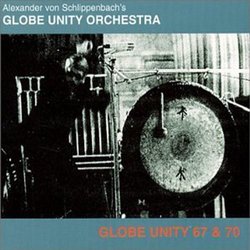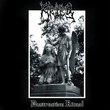| All Artists: Globe Unity Orchestra, Alexander Von Schlippenbach, Peter Brotzmann Title: Globe Unity '67-'70 (1967/70) Members Wishing: 1 Total Copies: 0 Label: ATAVISTIC Original Release Date: 1/1/2001 Re-Release Date: 3/31/2009 Genres: Jazz, Pop Styles: Avant Garde & Free Jazz, Swing Jazz Number of Discs: 1 SwapaCD Credits: 1 UPCs: 735286222326, 669910998908 |
Search - Globe Unity Orchestra, Alexander Von Schlippenbach, Peter Brotzmann :: Globe Unity '67-'70 (1967/70)
 | Globe Unity Orchestra, Alexander Von Schlippenbach, Peter Brotzmann Globe Unity '67-'70 (1967/70) Genres: Jazz, Pop
|
Larger Image |
CD DetailsSimilar CDs
|
CD ReviewsEnergy is eternal delight R. Hutchinson | a world ruled by fossil fuels and fossil minds | 09/11/2004 (5 out of 5 stars) "This is an incredible example of '60s energy music, a sure-fire way to clear your head. Schlippenbach, Brotzmann, and a small circle of Europeans joined the Free Revolution years before any but a tiny handful in the States realized it. This disc includes the earliest recording of the Globe Unity Orchestra, from 1967! As Schlippenbach says in the liner notes,
"I was able to put together a big band of some suitable musicians I knew, in which two already-existing groups (the Manfred Schoof Quintet and the Peter Brotzmann Trio) provided as it were a double nucleus..." The first performance by the Orchestra was in November of 1966, so this October, 1967 recording is one of, but not THE first. There are 19 musicians captured live on 10/21/67 at Donaueschingen, including Alexander von Schlippenbach (piano), Peter Brotzmann (alto sax), Peter Kowald (bass), William Breuker (baritone sax), Albert Mangelsdorff (trombone), and Jaki Liebezeit (drums), who would go on to be Can's drummer. This is a mainly German ensemble, with a few Dutch players, and perhaps one from the U.K. and one from France, based on the names (Jiggs Wigham and Claude Deron). The structure of the 34-minute "Globe Unity '67" is not so different from Coltrane's ASCENSION from 1965 -- loud sustained blasts from the entire band, punctuated by solo features and quieter passages. Guaranteed to send most people running away, filled with fear and loathing, but exhilarating to me! The difference between Globe Unity and Coltrane becomes clear in the between-blasts sections -- whereas ASCENSION is jazz, even if free, Globe Unity is not jazz. There is rhythm, but no swinging pulse -- it is more abstract than that. "Globe Unity '70" is 18-minutes long, and is less loud and ecstatic than the 1967 performance. The 20 musicians now include several of the key British free players -- Evan Parker (tenor & soprano sax), Derek Bailey (guitar), Kenny Wheeler (trumpet), and Paul Rutherford (trombone). Han Bennink (drums) from the Netherlands, is now on board as well. The music has more space, and according to Schlippenbach's notes, the composition gave only a few instructions to the players, leaving the rest to improvisation. There is an Asian-sounding passage near the end, with someone (Brotz? Bennink?) blowing through a horn and half-singing, sounding like a ghost or spirit. This suggests Vietnam to me, and I know that this circle of musicians was of the Left, and that the Vietnam War was raging, but there are no lyrics and nothing political in the liner notes. Other than the obvious, that is -- the name of the group! This is fantastic music! It captures the raw energy, passion, and idealism of the late '60s, as well as some of the earliest documentation of the European free improv movement. Thanks to John Corbett and Atavistic Records and their Unheard Music series for making this previously unheard music available!" |

 Track Listings (2) - Disc #1
Track Listings (2) - Disc #1

